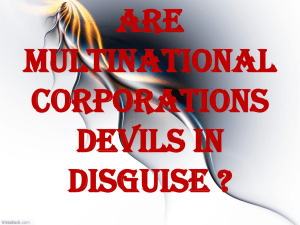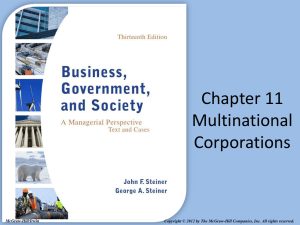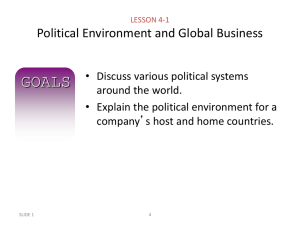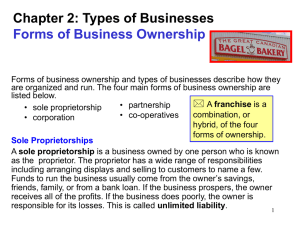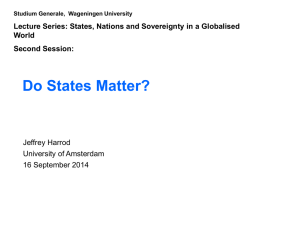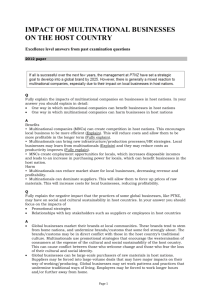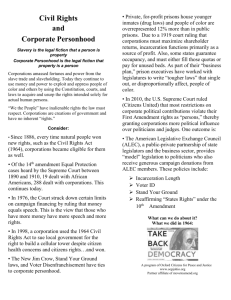Establishing guidelines governing multinational corporate
advertisement
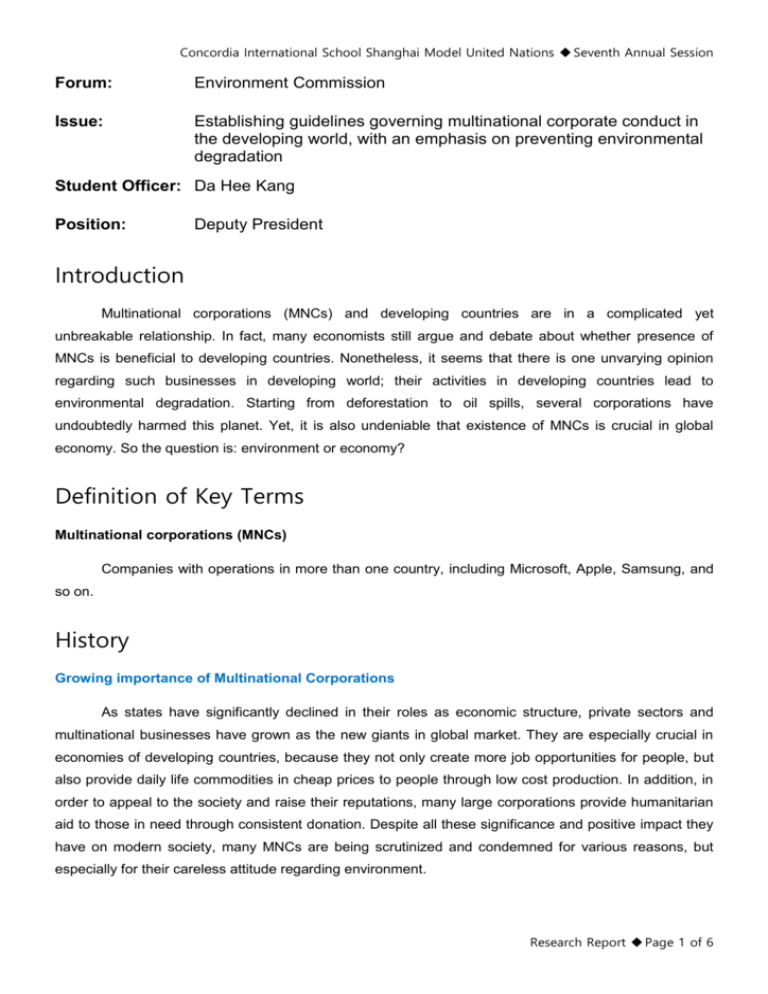
Concordia International School Shanghai Model United Nations ◆ Seventh Annual Session Forum: Environment Commission Issue: Establishing guidelines governing multinational corporate conduct in the developing world, with an emphasis on preventing environmental degradation Student Officer: Da Hee Kang Position: Deputy President Introduction Multinational corporations (MNCs) and developing countries are in a complicated yet unbreakable relationship. In fact, many economists still argue and debate about whether presence of MNCs is beneficial to developing countries. Nonetheless, it seems that there is one unvarying opinion regarding such businesses in developing world; their activities in developing countries lead to environmental degradation. Starting from deforestation to oil spills, several corporations have undoubtedly harmed this planet. Yet, it is also undeniable that existence of MNCs is crucial in global economy. So the question is: environment or economy? Definition of Key Terms Multinational corporations (MNCs) Companies with operations in more than one country, including Microsoft, Apple, Samsung, and so on. History Growing importance of Multinational Corporations As states have significantly declined in their roles as economic structure, private sectors and multinational businesses have grown as the new giants in global market. They are especially crucial in economies of developing countries, because they not only create more job opportunities for people, but also provide daily life commodities in cheap prices to people through low cost production. In addition, in order to appeal to the society and raise their reputations, many large corporations provide humanitarian aid to those in need through consistent donation. Despite all these significance and positive impact they have on modern society, many MNCs are being scrutinized and condemned for various reasons, but especially for their careless attitude regarding environment. Research Report ◆ Page 1 of 6 Concordia International School Shanghai Model United Nations ◆ Seventh Annual Session Conflict between Niger Delta region and Shell Corporation Damage in Niger Delta region caused by Shell – a multinational corporation dealing oils – is a perfect example of how lethal and harmful the activities of multinationals can be. Due to years of reckless oil exploration and ecological conflict by several oil multinationals, mainly Shell, Nigeria has seen severe damages in its environment, including coastal erosion, land degradation, oil pollution, depletion of water, and so on. Although admitted its fault and announced to clean the area, Shell has taken negligent demeanor and means to purify the contamination in Niger Delta, only worsening the situation. Caption #1: Photo of oil spill from Shell Corporation taken in the Niger Delta region. Key Issues International environmental regulations on MNCs activities As non-state firms that are not fully restricted under federal laws, multinational corporations are not even bound to multilateral environmental agreements (MEAs) between states. According to studies, MNCs are able to take advantage over their multinational and ephemeral nature, and avoid strict and regulatory environmental restrictions from both home state and host state. Granted, local governments have their full authority to put pressure upon such companies. However, since majority of these Research Report ◆ Page 2 of 6 Concordia International School Shanghai Model United Nations ◆ Seventh Annual Session businesses run in developing countries, governments do not prioritize environmental issues. Consequently, vast majority of firms not only harm nature through extremely low environmental standards, but also take very little responsibility in recovering damaged area. Human rights of workers abused by MNCs While environmental degradation is a serious issue getting significant attentions, it is not the only negative impact that MNCs have brought upon developing countries. Blinded and driven by their economic interest, many corporations use inhumane and violent means to get civilians and workers under control. To take Nigerian conflict as an example, Shell has used its own private military to control, and even kill, villagers who were against the oil extraction in Niger Delta area. In addition, Shell military forces wrecked and destroyed a number of local villages for the sake of oil exploration and extraction. During this process, many innocent civilians were injured and forced out of their home. Major Parties Involved and Their Views Nigeria Although the government of Nigeria had gone through reformation from military to civilian in 1999, it is still inept in dealing with unethical behaviors of large corporations. Even until very recently in 2013, Shell was criticized by Amnesty International that it is contributing in oil spills that annually occur in Nigeria. The government and its people are also aware that Nigeria has one of the worst human rights record, yet they prioritize economic development rather than such issues. Caption #2: The logo of Movement for the Emancipation of the Niger Delta (MEND). International Oil Companies (IOCs) Research Report ◆ Page 3 of 6 Concordia International School Shanghai Model United Nations ◆ Seventh Annual Session IOCs, including Shell Corporation, are one of the leading factors of ecological degradation in developing countries. They are currently being disparaged by several governmental and nongovernmental organizations, such as United Nations, Amnesty International, and so on. As a result of international pressure, a portion of these firms are improving and strengthening their environmental standards. China According to announcement made by Ma Jun, the director of the nongovernmental Institute of Public & Environment Affairs, about 33 multinational corporations were punished for committing environmentally harmful actions in the past three years. China, as one of the countries with the most factories of various multinationals, has very strict policy regarding environment and is increasingly becoming aware of the importance of preserving the ecosystem. Timeline of Relevant Resolutions, Treaties and Events Date Description of event December 2, 1984 November 30, 1990 May 15, 2002 Toxic gases released from the Union Carbide pesticide plant accident, which killed more than 5000 residents. International Convention on Oil Pollution Preparedness, Response and Cooperation (OPRC) adopted. Report condemning and scrutinizing several multinational corporations in developing countries released by United Nations Environment Program (UNEP) Movement for the Emancipation of the Niger Delta (MEND) makes its first official January 11, 2006 and international ‘debut’ as a militant group by attacking one oil field that belongs to Shell Corp. April 20, 2010 Oil spill in the Gulf of Mexico, caused by British Petroleum (BP). Evaluation of Previous Attempts to Resolve the Issue In order to protect environment in numerous developing countries and raise awareness about unscrupulous and irresponsible attitude of MNCs, United Nations Environment Program (UNEP) published an extensive and comprehensive report in 2002. The report critically analyzed the situation, and claimed that this issue will not be resolved until all businesses fully participate and support. However, this report does not have any practical means that can restrict large firms from destroying nature. In Research Report ◆ Page 4 of 6 Concordia International School Shanghai Model United Nations ◆ Seventh Annual Session addition, many governments of developing countries are still hesitant to litigate MNCs, since such decision can hinder national economic development. Possible Solutions Creating a comprehensive and strict environmental regulation regarding industrial activities that applies to all multinational corporations should be made. As aforementioned, administrations of developing countries are aware of the growing problem, yet are afraid, and reluctant to limit large companies. Thus, member nations of United Nations and/or More Economically Developed Countries (MEDCs) should aid in establishing eco-friendly regulations that apply to every industrial activity. Furthermore, home state or host state of the company should consider sending regular inspectors to the workplaces and update with ongoing situations on a regular basis. Bibliography Adedeji, Lanre. "THE WRECKAGE OF MULTINATIONAL CORPORATIONS IN THE NIGERIAN PETROLEUM INDUSTRY." The Lawyers Chronicle. Web. 14 Nov. 2015. <http://thelawyerschronicle.com/the-wreckage-of-multinational-corporations-in-the-nigerian-petroleumindustry/>. Ahiakpor, James C.W. "Multinational Corporations in the Third World: Predators or Allies in Economic Development?" Acton Institute. Religion & Liberty Volume 2, Number 5. Web. 14 Nov. 2015. <http://www.acton.org/pub/religion-liberty/volume-2-number-5/multinational-corporations-third-worldpredators-o>. Digdowiseiso, Kumba. "How MNCs Threaten Our Environment." Jakarta Post. 22 Oct. 2010. Web. 14 Nov. 2015. <http://www.thejakartapost.com/news/2010/10/22/how-mncs-threaten-our-environment.html>. "First Decade 2000-09." Environmental History Timeline. Web. 14 Nov. 2015. <http://66.147.244.135/~enviror4/21st-century/firstdecade-2000-09/>. Khor, Martin. "Developing Countries Should Get Paid for Environmental Damage." Atlantic Community. 1 Oct. 2010. Web. 14 Nov. 2015. <http://www.atlanticcommunity.org/index.php/Global_Must_Read_Article/Developing_Countries_Should_Get_Paid_for_En vironmental_Damage>. Liu, Jian Qiang. “Multination Corporations Violating China’s Environmental Laws and Regulations.” World Watch. Web. 14 Nov. 2015. <http://www.worldwatch.org/node/4764>. Nambella, Vidyaranya Chakrivarthy. “Global Environmental Liability: Multinational Corporations under Scrutiny.” Exchanges: The Warwick Research Journal. 2014. Web. 14 Nov. 2015. <http://exchanges.warwick.ac.uk/index.php/exchanges/article/view/26/100>. Research Report ◆ Page 5 of 6 Concordia International School Shanghai Model United Nations ◆ Seventh Annual Session Ohio, Donny. "Multi-national Companies in Nigeria." Human Rights Server. Web. 14 Nov. 2015. <http://www.humanrights.de/doc_en/countries/nigeria/multinationals.html>. Pettinger, Tejvan. "Multinational Corporations: Good or Bad?" Economics Help. May 30, 2008, 30 May 2008. Web. 14 Nov. 2015. <http://www.economicshelp.org/blog/538/economics/multinational-corporations-good-or-bad/>. Roach, Brian. "Social and Environmental Responsibility of Corporations." Social and Environmental Responsibility of Corporations. 7 Nov. 2008. Web. 14 Nov. 2015. <http://www.eoearth.org/view/article/156067/>. Sagay, Jonathan, Zephaniah Osuyi Edo, and Lucky Avweromre. ENVIRONMENTAL DEGRADATION AND THE DILEMMA OF SUSTAINABLE DEVELOPMENT: IMPLICATION FOR ENVIRONMENTAL SECURITY IN THE NIGER DELTA REGION. Publication. Vol. 3. N.p.: Cenresin Publications, 2011. Academia. Web. 11 Mar. 2011. <http://www.academia.edu/1751110/ENVIRONMENTAL_DEGRADATION_AND_THE_DILEMMA_ OF_SUSTAINABLE_DEVELOPMENT_IMPLICATION_FOR_ENVIRONMENTAL_SECURITY_IN_TH E_NIGER_DELTA_REGION>. Shah, Anup. "Corporations and the Environment." Global Issues. 25 Mar. 2002. Web. 14 Nov. 2015. <]http://www.globalissues.org/article/55/corporations-and-the-environment>. "The World's Worst Environmental Disasters Caused by Companies." Business Pundit. 21 June 2010. Web. 14 Nov. 2015. <http://www.businesspundit.com/the-worlds-worst-environmental-disasters-caused-by-companies/>. Research Report ◆ Page 6 of 6
